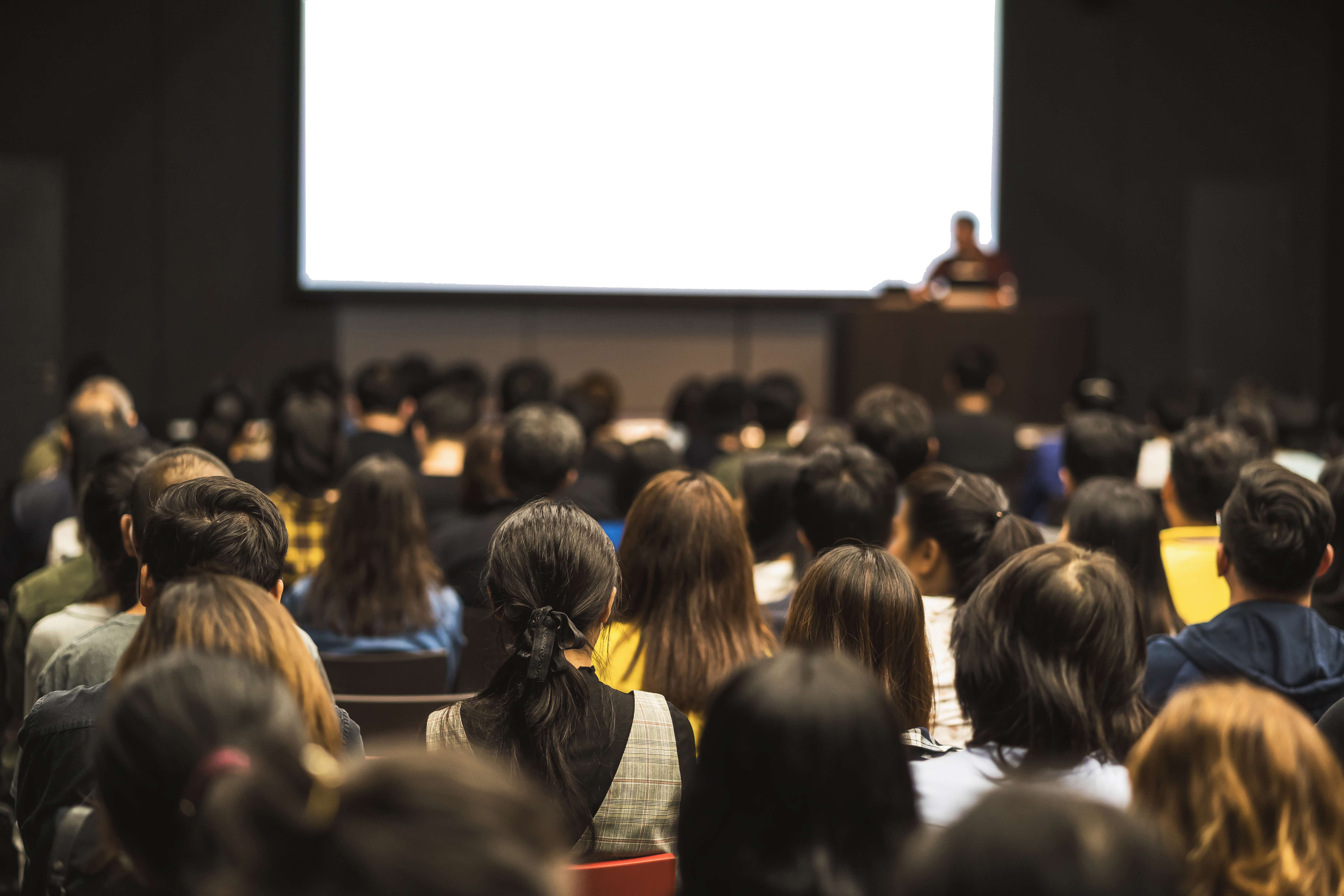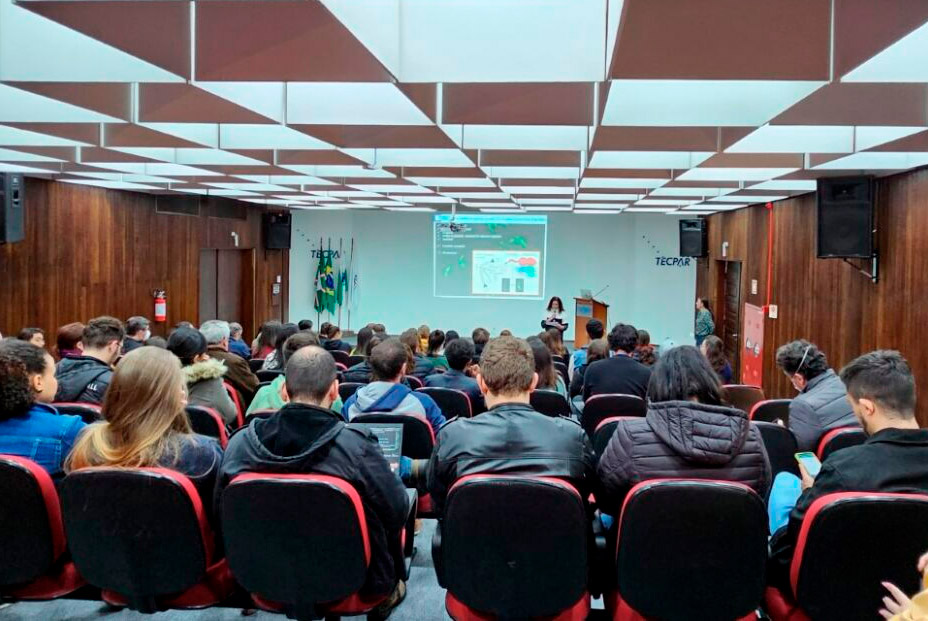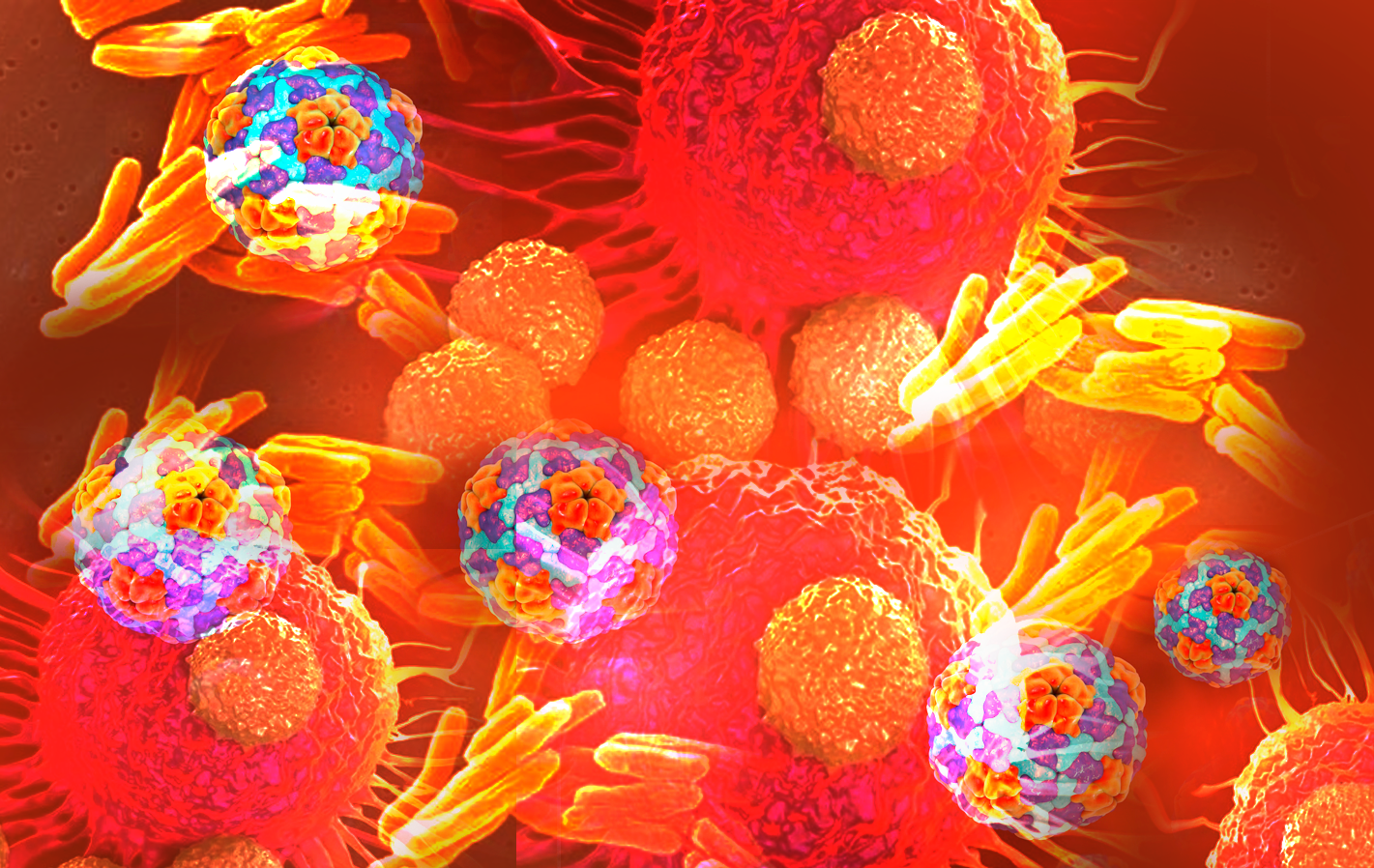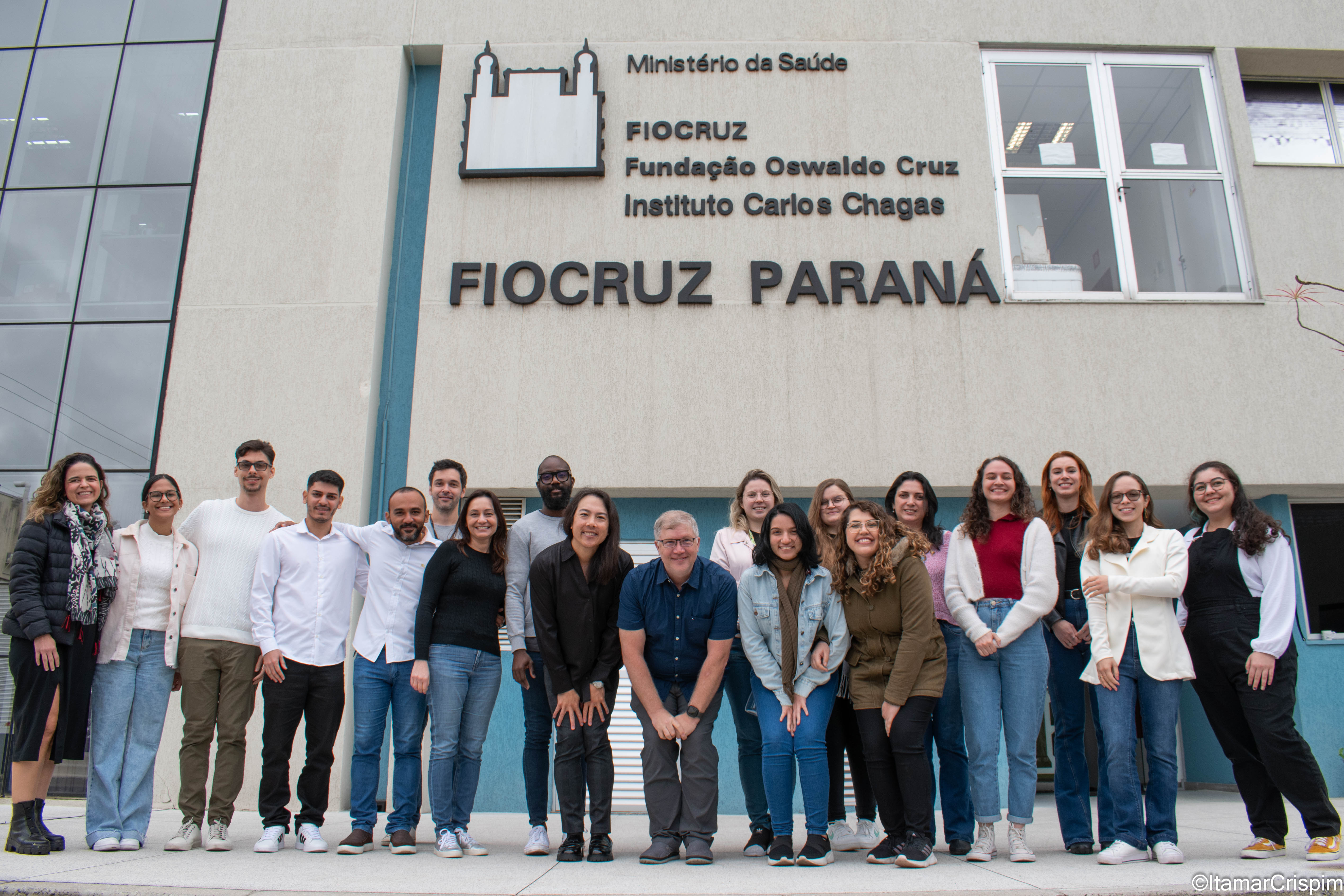Os Cursos Internacionais PPGBB têm como objetivo intensificar o desenvolvimento da internacionalização e a excelência da educação no Programa de
Pós-graduação em Biociências e Biotecnologia, e contribuir para o processo de internacionalização da pós-graduação stricto sensu e da ciência, tecnologia e inovação.
Cursos Internacionais PPGBB

Entre em contato conosco
Cursos anteriores
Coordinator: Fabio Passetti
Collaborating Professors: Dr. Lucía Spangenberg and Dr. Hugo Naya from the Institut Pasteur de Montevideo
Course Load: 24 hours
Period: November 22 to 24, 2022
Schedule: Tuesdays and Fridays, from 1:00 PM to 3:00 PM
Syllabus:
- Day 1: Introduction to Next-Generation Sequencing (NGS); mapping and quality analysis using Linux and R; and mapping with calibration of Whole Exome Sequencing (WES) data.
- Day 2: Identification of genetic polymorphisms; types of genetic variants and quality analysis; and practical session with GATK software for identifying genetic polymorphisms in WES data.
- Day 3: Epidemiology applied to genetics; population genomics; and exercises with case discussions.
- Em Combining induced pluropotent …
Coordinator: Tatiana de Arruda Campos Brasil de Souza
Collaborating Professor: Dr. Helen Cristina Miranda (Case Western University)
Course Load: 30 hours
Period: October 24 – 28, 2022
Schedule: 9:00 AM – 5:00 PM
Syllabus:
Module I
Available from October 17, 2022: Theoretical and practical classes on the use of visualization and manipulation programs for three-dimensional structures such as PyMOL, Chimera, etc. Analysis of protein-protein interactions. Online program for three-dimensional structure modeling.
Module II
October 24 – Theoretical classes on basic concepts of stem cells, isolation, culture, characterization, and differentiation of adult and pluripotent stem cells.
October 26, 2022 – How to model neurological diseases using 2D and 3D human stem cell cultures.
Invited professors
- Adam C. Smith – University of Toronto
- José-Mario Capo-Chichi – University of Toronto
- Hubert Tsui – University of Toronto
Invited professors
- Adam C. Smith – University of Toronto
- José-Mario Capo-Chichi – University of Toronto
- Hubert Tsui – University of Toronto
- Understand the updated classification of hematologic malignancies launched in 2022 by the World Health Organization and the International Consensus Classification.
- Discuss the differences and problems related to the diagnosis of these diseases.
- Review the use of cytogenetics and cytogenomic techniques to detect structural variants. Understand and apply the International Standard for Cytogenetic Nomenclature (ISCN) in practical cases and scenarios. Review cytogenetic techniques related to diagnosis.
- Review the techniques used in Molecular Genetics laboratories.
- Compare the advantages and disadvantages of various techniques.
- Use the acquired knowledge in specific objectives 1-3 for application in practical cases and scenarios.
- Discussion of testing approaches in “resource-rich” and “resource-poor” environments. Investigate new applications for genetic testing in Onco-Hematology, including proposing hereditary leukemias and other special topics.
Part 1
-
Basic concepts of Biology of Cancer and Hematological Neoplasms: 8 hours
-
Genomic Basis of Hematological Neoplasms: 4 hours
-
WHO and ICC classification of Hematological Neoplasms: 4 hours
Part 2
- Cytogenetic and Molecular Methods Molecular Nomenclature (HGNC): 2 hours
-
Cytogenetic Nomenclature (ISCN) : HGNC and ISCN Nomenclature Workshop : 4 hours
Part 3
- New Generation of Biomarker Testing and characterization of Acquired Hematologic Neoplasms Using NGS: 4 hours
- Optical genome mapping (OGM) applied to Hematological Neoplasms: 4 hours
- Workshop – Case examples with report using mock NGS and GMO results: 4 hours
- Additional Topics of Interest: What is CHIP and CCUS (Clonal Hematopoesis of Interdeterminant Potential and Clonal Cytopenia of Undetermined Significance): 2 hours
- Hereditary Predisposition to Hematologic Neoplasms: Case Discussion: 4 hours
The aim of this workshop is to give some tips and tools to researchers interested in studying the structure-function relationships in macromolecules and macromolecular complexes. To get a deep understanding of a biological process, an integration between biophysics, biochemistry, bioinformatics and structural biology is important. It is also important to stress the fact that one cannot be expert in each and every field, but each expertise is important to build the puzzle. Nevertheless, having an idea of which are the possibilities, and the possible pitfalls of several techniques will be fundamental to choose the right collaboration and to better follow their approaches and results. Therefore, I shall present some of the techniques with specific examples, also in relationships with the possibilities offered by Synchrotrons.
Responsible teacher
Adriana Erica Miele – teacher of Biochemistry and Biophysics at the University Claude Bernard Lyon 1. Lyon,
Researchgate: https://www.researchgate.net/profile/Adriana-Miele
- The theoretical classes will be offered in a hybrid format only for participants outside of Curitiba.
- The practical class will be limited to 18 participants. Those interested in the practical class should indicate their intention by sending a text justifying their interest.
Registration for the practical class – https://forms.gle/ogxMegXnao4eC4cYA
Monday October 30th 2023
9:00-10:30 – Integrative structural biology
An introduction on the different methods that can be used to gain structural information on macromolecules, with emphasis on Microscopy (super resolution, atomic force and electron microscopies), NMR, crystallography and small angle X-ray scattering (SAXS)
11:00-12:30 – cryoElectron Microscopy (cryoEM)
A quick tour on the theory and practice of EM, including sample preparation and a few examples of applications.
Break
14:00-15:30 – Tutorial on SAXS
EMBL-Hamburg offers the package ATSAS for data analysis online as well as for download. The tutorial will show how to analyse protein SAXS data and which information can be obtained.
Tuesday October 31st 2023
9:00-10:30 – How to read a structure paper: a hitchhiker guide for non structuralists
Seeing is believing, but which are the possible pitfalls to avoid if you are not a specialists? A guided tour on a few examples.
11:00-12:00 – When structure meets function (or not)
Schistosoma mansoni is a complex multicellular parasite and an interesting biological puzzle, needing a multi-technical approach to be tackled.
The analysis of the immunological response to different pathogens represents an important tool for understanding the pathogenesis of infections, as well as for the development of vaccines and therapies.
One of the fundamental aspects of the immune response is the recognition of foreign invaders and the development of an immune response. At the cellular level, immune cells can sense pathogen associated molecular patterns (PAMPs) and start an immune response at the cellular level. Specifically for viral pathogens, cells sense the pathogens using different receptors and initiate the modulation of intrinsic cells factors and pathways (like type I IFN) which present antiviral activity. Understanding the role of these pathways may lead to the development of antiviral strategies, either specific or broadly to multiple viruses.
Additionally, from a systemic point of view one important characteristic of the immune response is the ability of immune cells to migrate to the site of infection, or even to circulate through different immune organs (lymph nodes, spleen and thymus). This property of immune cells is responsible for capturing non-self antigens in the periphery, initiating specific immune responses in immune tissues. Therefore, analyzing how this cell migration occurs in vivo is relevant to understand the dynamics of the immune response to antigens. Furthermore, this knowledge can be useful for the development of more efficient vaccines, or for the treatment of immunological disorders associated with cell migration to inflamed tissues.
For some pathogens these studies are quite limited, due to the handling biosafety level, or the difficulty of cultivating those microorganisms in vitro and/or in vivo. The hepatitis B virus (HBV) represents a classic example of a pathogen in which the in vitro and in vivo cultivation of the agent represents one of the main challenges. Although there is a safe and efficient vaccine for preventing acute and chronic infection with the virus, curing chronically infected patients still represents a key challenge. In vitro and in vivo culture systems for this pathogen, although useful, still have major limitations. Additionally, studies involving the infection/transfection of susceptible cells (HepG2 or Huh7.5 expressing the sodium taurocholate co-transporting peptide, NTCP receptor) have brought some advances, but there are still important limitations. Therefore, the course will focus on in vitro cultivation of HBV on HepG2-NTCP cells and the recently described HBV pregenomic RNA (pgRNA) system to study HBV biology and the antiviral immune response. Also, the Bacillus Calmette-Guérin (BCG), the vaccine against tuberculosis, will be used to study cell migration using protocols that allow cell tracking and enable the understanding of the migration dynamics of different cells in vivo.
Finally, students will have the opportunity to learn about new tools and protocols for studying the immune response against HBV and BCG, which can be adapted to other pathogens of interest.
Program
Day 1 (10/28/2024)
9:00-10:30h – Theoretical class I – General aspects of HBV biology
Lefteris Michailidis, PhD – Emory University, Atlanta, USA.
11:00-12:00h – Protocol Discussion I – Virus stock preparation, infection of HepG2-NTCP cells with HBV, and a cell culture system supporting the complete life cycle of HBV
Lefetris Michailidis, PhD – Emory University, Atlanta, USA
13:30-18:00h – Practical class I – Stock preparation, infection of HepG2-NTCP cells with HBV
Lefetris Michailidis, PhD – Emory University, Atlanta, USA
Day 2 (10/29/2024)
9:00-10:30h – Theoretical class II – Primary human hepatocytes as a model to study HBV biology and innate immune responses
Lefteris Michailidis, PhD – Emory University, Atlanta, USA
11:00-12:00h – Protocol Discussion II – Targeted arrayed overexpression and CRISPR KO screens for virus-host interaction studies in the context of HBV infection
Lefteris Michailidis, PhD – Emory University, Atlanta, USA
13:30-18:00h – Practical class II – Targeted arrayed overexpression and CRISPR KO screens for virus-host interaction studies in the context of HBV infection Lefteris Michailidis, PhD – Emory University, Atlanta, USA
Day 3 (10/30/2024)
9:00-10:30h – Theoretical class III – An RNA-based system to study HBV replication and evaluate antivirals
Yingpu Yiu, PhD – Rockefeller University, New York, USA.
11:00-12:00h – Protocol Discussion III – Transfection of susceptible cells with pgRNA or HBV DNA plasmids
Yingpu Yiu, PhD – Rockefeller University, New York, USA.
13:30-18:00h – Practical class III – Transfection of susceptible cells with pgRNA or HBV DNA plasmids
Yingpu Yiu, PhD – Rockefeller University, New York, USA.
Day 4 (10/31/2024)
9:00-10:30h – Theoretical class IV – HBV readouts for studying HBV biology, virus-host interactions and antivirals
Yingpu Yiu, PhD – Rockefeller University, New York, USA.
11:00-12:00h – Protocol Discussion IV – HBV quantification on the supernatant of cell cultures by Real Time PCR and analysis of the expression of HBV S antigen by Flow Cytometry
Yingpu Yiu, PhD – Rockefeller University, New York, USA.
13:30-18:00h – Practical class IV – HBV quantification on the supernatant of cell cultures by Real Time PCR and analysis of the expression of HBV S antigen by Flow Cytometry
Yingpu Yiu, PhD – Rockefeller University, New York, USA.
Day 5 (11/01/2024)
9:00-10:30h – Theoretical class V – Deep mutation scanning of hepatitis B virus reveal a mechanism for cis-preferential reverse transcription (virtual class)
William Schneider, PhD – Rockefeller University, New York, USA.
11:00-12:30h – General discussion – How to choose the right laboratory for a Postdoc?
Yingpu Yiu, PhD – Rockefeller University, New York, USA.
Lefteris Michailidis, PhD – Emory University, Atlanta, USA (virtual)
William Schneider, PhD – Rockefeller University, New York, USA (virtual)
14:30-16:30h – Theoretical class VI – Discussion on the experimental results and protocols
Yingpu Yiu, PhD – Rockefeller University, New York, USA.
Lefteris Michailidis, PhD – Emory University, Atlanta, USA (virtual)
16:30h – 18:00h – Happy hour
Suggested reading for the first week of the course:
Tsukuda S, Watashi K. Hepatitis b virus biology and life cycle. Antiviral Res 2020, 182:104925. doi: 10.1016/j.antiviral.2020.104925
Seeger C, Mason WS. Molecular biology of hepatitis B virus infection. Virology 2015, 479-480:673:86. doi: 10.1016/j.virol.2015.02.031
Michailidis E, et al. A robust cell culture system supporting the complete life cycle of hepatits B virus. Scientific Report 2017, 7(1):16616. doi: 10.1038/s41598-017-16882-5
Michailidis E, et al. Expansion, in vivo-ex vivo cycling, and genetic manipulation of primary human hepatocytes. Proc Natl Acad Sci USA 2020, 117(3):1678-1688. doi: 10.1073/pnas.1919035117
Kabbani M, et al. Human hepatocyte PNPLA3-148M exacerbates rapid non-alcoholic fatty liver disease development in chimeric mice. Cell Rep 2022, 40(11):111321. Doi: 10-1016-j.celrep.2022.111321
Yu Y, et al. An RNA-based system to study hepatitis B virus replication and evaluate antivirals. Sci Adv 2023, 9(15).eadg6265. doi: 10-1126/sciadv.adg6265
Yu Y, et al. Deep mutational scanning of hepatitis B virus reveals a mechanism for cis-preferential reverse transcription. Cell 187(11):2735-2745. doi:10-1016/j.cell.2024.04.008
Week 2
9:00-10:30h – Theoretical class VII –T-cell priming to mycobacteria I: Dendritic cells and BCG
Dr. Antonio Rothfuchs – Karolinska Institutet, Stockholm, Sweden
Day 6 (11/04/2024)
11:00-12:00h – Protocol Discussion V – CFSE-based migration assay (skin-draining lymph nodes)
Dr. Veronika Krmeská, PhD – Karolinska Institutet, Stockholm, Sweden
13:30-18:00h – Practical class V –Preparation for practical (CFSE-based migration assay)
Dr. Veronika Krmeská, PhD – Karolinska Institutet, Stockholm, Sweden
Day 7 (11/05/2024)
09:00-10:00h – Protocol Discussion VI – Analysis of mouse lymph node by flow cytometry: Dendritic cell subsets and other phagocytes
Dr. Veronika Krmeská, PhD – Karolinska Institutet, Stockholm, Sweden
10:30-18:00h – Practical class VI – Analysis of mouse lymph node by flow cytometry Dr.Veronika Krmeská, PhD – Karolinska Institutet, Stockholm, Sweden
Day 8 (11/06/2024)
10:00-12:00h – Practical class VII – Review of analysis and results and analysis Practical V-VI
Dr. Antonio Rothfuchs – Karolinska Institutet, Stockholm, Sweden
Dr. Veronika Krmeská, PhD – Karolinska Institutet, Stockholm, Sweden
13:00-14:30h – – Theoretical class VIII – Defining the role of migratory Dendritic cells in priming T cells to mycobacteria
Dr.Veronika Krmeská, PhD – Karolinska Institutet, Stockholm, Sweden
15:00-16:00h – Theoretical class XI – T-cell priming to mycobacteria II: tuberculosis
Dr. Antonio Rothfuchs – Karolinska Institutet, Stockholm, Sweden
16:20-17:30h Practical class VIII – to be defined
Dr. Veronika Krmeská, PhD – Karolinska Institutet, Stockholm, Sweden
Day 9 (11/07/2024)
09:30-12:00h – Practical class IX – Antibody-based assay migration assay
Dr. Veronika Krmeská, PhD – Karolinska Institutet, Stockholm, Sweden
13:00-15:00 – Practical class X– to be defined
Day 10 (11/08/2024)
10:00-11:30h – Practical class VII – Review of analysis and results and analysis Practical IX-X
Dr. Antonio Rothfuchs – Karolinska Institutet, Stockholm, Sweden
Dr. Veronika Krmeská, PhD – Karolinska Institutet, Stockholm, Sweden
13:00-14:00h – General discussion on results and protocols
Dr. Antonio Rothfuchs – Karolinska Institutet, Stockholm, Sweden
Dr. Veronika Krmeská, PhD – Karolinska Institutet, Stockholm, Sweden
14:00-15:00h – Theoretical class XI – “Memorias de um Carioca Suéco” Research experiences from KI
Dr. Antonio Rothfuchs – Karolinska Institutet, Stockholm, Sweden
16:30h – 18:00h – Happy hour
Suggested reading for the second week of the course:
Bollampalli VP, Nylén S, Rothfuchs AG. A CFSE-based Assay to Study the Migration of Murine Skin Dendritic Cells into Draining Lymph Nodes During Infection with Mycobacterium bovis Bacille Calmette-Guérin. J Vis Exp. 2016 Oct 9;(116):54620. doi: 10.3791/54620.
Bollampalli VP, Harumi Yamashiro L, Feng X, Bierschenk D, Gao Y, Blom H, Henriques-Normark B, Nylén S, Rothfuchs AG. BCG Skin Infection Triggers IL-1R-MyD88-Dependent Migration of EpCAMlow CD11bhigh Skin Dendritic cells to Draining Lymph Node During CD4+ T-Cell Priming. PLoS Pathog. 2015 Oct 6;11(10):e1005206. doi: 10.1371/journal.ppat.1005206.
Aggio JB, Krmeská V, Ferguson BJ, Wowk PF, Rothfuchs AG. Vaccinia Virus Infection Inhibits Skin Dendritic Cell Migration to the Draining Lymph Node. J Immunol. 2021 Feb 15;206(4):776-784. doi: 10.4049/jimmunol.2000928.
Krmeská V, Aggio JB, Nylén S, Wowk PF, Rothfuchs AG. Cyclooxygenase-Derived Prostaglandin E2 Drives IL-1-Independent Mycobacterium bovis Bacille Calmette-Guérin-Triggered Skin Dendritic Cell Migration to Draining Lymph Node. J Immunol. 2022 Jun 1;208(11):2549-2557. doi: 10.4049/jimmunol.2100981.
Krmeská V, Shen L, Nylén S, Wowk PF, Rothfuchs AG. BCG infection dose guides dendritic cell migration and T cell priming in the draining lymph node. Scand J Immunol. 2024 Mar;99(3):e13342. doi: 10.1111/sji.13342.
Rufino de Sousa N, Sandström N, Shen L, Håkansson K, Vezozzo R, Udekwu KI, Croda J, Rothfuchs AG. A fieldable electrostatic air sampler enabling tuberculosis detection in bioaerosols. Tuberculosis (Edinb). 2020 Jan;120:101896. doi: 10.1016/j.tube.2019.101896.
Rufino de Sousa N, Margerie L, Steponaviciute L, Roux J, Kinahan MW, Olsson D, Ásgeirsson H, Udekwu KI, Rothfuchs AG. Detection of active SARS-CoV-2 in cough aerosols from COVID-19 patients. Infect Dis (Lond). 2024 Jul 8:1-9. doi: 10.1080/23744235.2024.2374307.
Organizers
Juliano Bordignon – Pryscilla Fanini Wowk – Ana Luiza Pamplona Mosimann







